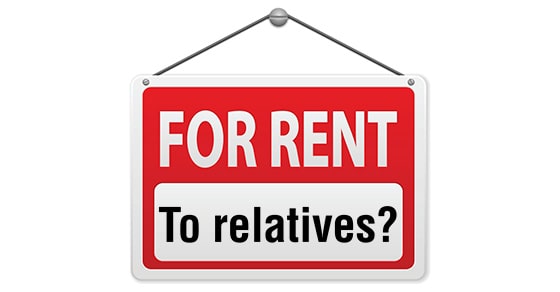
If you own a home and rent it to a family member, you may be surprised to find out there could be tax consequences. Knowing the rules ahead of time can help you watch out for tax traps and be aware when renting to a relative.
Quick Rundown of the Rules for Renting
Renting out a home or apartment that you own may result in a tax loss for you, even if the rental income is more than your operating costs. You’ll be entitled to a depreciation deduction for your cost of the house or apartment (except for the portion allocated to the land). However, if your tenant is related to you, special rules and limitations may apply. For this purpose, “related” means a spouse, child, grandchild, parent, grandparent, or sibling.
No limitations apply if:
- You rent a home to a relative who uses it as his or her principal residence (that is, not just as a second or vacation home) for the year, and
- The home is rented at a fair market rent amount (not at a discount).
In these cases, you can deduct all the normal rental expenses, even if they result in a rental loss for the year. (If you have a loss, however, it’s a “passive” loss, which may be subject to a different set of limitations.)
Below Fair Market Rent
Problems arise if you set the rent below the fair market rental value. The reason is that this then becomes a rental property that you’ve treated as using personally. So, you’d have to allocate the expenses between the personal and rental portions of the year. Even more seriously, however, since all the rental days (at a bargain rate to a relative) are treated as personal days, the rental portion would be zero. Thus, you’d have to report all the rent you receive in income, but none of your expenses for the home would be deductible. (You’d still be able to deduct the mortgage interest, assuming it otherwise qualifies as deductible, and property taxes. These items are deductible even for nonrental homes.)
Given the above problems, it’s important to set the rent at a fair rate. Factors to look at include comparable rentals in the area and whether you made any “side” gifts to your relative (to help pay the rent) that could reasonably be interpreted to be a bargain element.
We Can Answer Your Questions
The best way to avoid tax traps is to know the rules and be aware when renting to a relative. If you’re in this situation and still have questions, we can help. The tax professionals at Ramsay & Associates can provide you with answers or discuss these matters with you in more detail. Contact us today.



